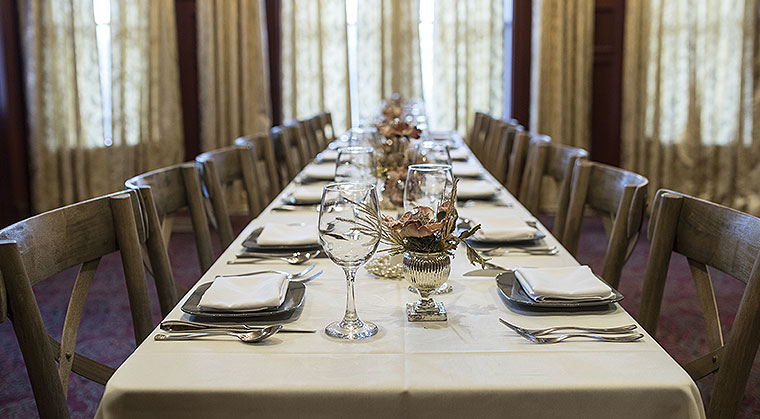Open House

This is a good chance to test out her teacher’s concerns. I watch her closely for signs of not hearing, or misunderstanding, as I launch into storyteller mode

"M
y teacher thinks I need my hearing checked.”
We’re walking home from school, Chaya and I, a bag over my shoulder and the shadow of clouds hurrying me forward.
“Mmm-hmm,” I say, thinking of rice and meatballs and everything I forgot to do on the way home from work before picking Chaya up.
“Because she kept thinking I wasn’t listening, when really I just didn’t hear her. She said she’s gonna call you, Mommy, kay?”
She’s gonna call you seeps into my consciousness. “What? Your teacher wants to speak to me?”
“I told you that already. Because I can’t hear so well at the back of the room.” She looks at me, wide-eyed. “Do you need to check your ears, Mommy? Because you don’t hear me sometimes.”
I have to laugh. “No, sweetie, Mommy is just distracted. When I’m thinking about so many things, like what we’re going to have for supper, it’s hard to listen at the same time.”
“Like me,” she says, and then she frowns. “But not really, because sometimes I really want to listen to the teacher and I just can’t hear her, or she’s in the middle of a story and starts talking in a tiny whispering voice and it’s too quiet for me.”
I’m alarmed. “Oh no, Chaya, why didn’t you tell me before?” My mind is in overdrive, trying to remember if I’ve noticed any signs of hearing difficulties. When I wake her in the morning? I always thought Chaya’s just a heavy sleeper — all my kids are. When I call her to come for meals? She usually comes, except when she’s busy with her games.... Have I missed something?
She shrugs. Before I can question her more, she gets distracted again. “Hey, Mommy, what’s that?”
She is pointing at a muddy green thing lying, sodden, in the gutter by our feet. It takes me a second or two to realize it’s a hat. Or it was a hat.
“Why did someone leave their hat there?” Chaya asks, bewildered.
I shrug, Mommy-knows-everything syndrome in full swing. How should I know? “Maybe it got too wet,” I suggest.
“Why?”
“Why do you think?” I counter. She thinks a minute. “The rain?”
“That’s what I think.”
“But,” her face puckers, “why couldn’t he just go home?”
I could’ve told her he was out shopping, or too far, or forgot his umbrella. But the hat is pulling memories from a forgotten corner of my brain, and instead I say, “You know that not everyone has a home. We’re very lucky, Chaya. When I was young, Bubby and Zeidy often had guests who didn’t have real homes of their own.”
It occurs to me that this is a good chance to test out her teacher’s concerns. I watch her closely for signs of not hearing, or misunderstanding, as I launch into storyteller mode.
“Mr. Fengler was one of our guests. He came to Bubby’s house a lot, for Shabbos meals, when I was a child. He was very poor, Chaya, we didn’t even know if he had a house... he used to come to shul sometimes and bring his friends. And Zeidy used to bring them home, and they’d be so hungry, like they hadn’t eaten in a few days!” Mommying instincts prompt me to throw in a limud. “Wasn’t that so special of Bubby and Zeidy? To give tzedakah and have guests all at once?”
Chaya’s eyes are round. “So why don’t we ever have poor guests?”
I almost laugh, but then her question echoes back at me.
“I’m... not sure, sweetheart. Maybe we can. Should we ask Tatty?”
She nods, eagerly, and I think again of Mr. Fengler and his friends. Joe-without-a-last-name and Mr. Reinstein, whom we nicknamed Mr. Rainstorm for the precious plastic cover over his battered hat. The cover was probably worth more than the hat itself, we kidded, giggling in the kitchen before pasting on serious faces and sidling into the dining room for Kiddush.
Ma hadn’t just hosted these guests, she’d sent food to them during the week — how she found their addresses, I don’t remember. She also took in half the neighborhood children when their parents were away. She was always hosting other people’s simchahs and paying visits and offering to step in when a family had just welcomed a new addition or a mother wasn’t well. And there were the university students and the irreligious taxi driver and a host of other people finding their way home — via our home.
I think of telling Chaya more about her bubby, give her something to look up to, but I dread the question and guilt complex to follow: So why don’t you do that, Mommy?
I try to calculate: I cook, I clean, I work, I shop. I... send gift platters to friends after birth? Had my sister-in-law over for a meal — oh, a couple of years ago? Sometimes answer the door to meshulachim, hand over a dollar or two?
Unease fills me. Why have I never thought about this?
As we step into the house, rain drizzles down behind us, and the watery gray seeps through my shoes and leaves a single, muddy footprint on the mat.
Ushi is surprised when I bring up the subject. “Guests for Shabbos? Isn’t it a lot of work for you?”
I shrug. “Not work. It’s chesed, you know?”
“Of course it’s chesed. But also more work for you. Besides, won’t the kids be shy?”
I tell him about Chaya’s question earlier. “I think she’ll enjoy it. The others are very little, they’ll get used to it. And we don’t need to have guests every Shabbos. Just some of the time...”
He looks unconvinced.
“Besides,” I say, “what better way to teach them about mitzvos, like guests and stuff, than if they see it in real life?”
He makes an impressed face. “Psssh, my wife, the rebbetzin.”
“And there’s the kiruv aspect as well....”
Ushi’s expression changes.
“What do you mean, kiruv part? Who do you intend to invite?”
I think of Jackie and Leora who came every week for two years, back when I was young.
“Oh, I don’t know, just thinking aloud,” I say vaguely. Kiruv was never one of Ushi’s top-ten life goals.
“Listen, Shayna, it sounds like a nice idea, having guests, and b’etzem I don’t have any issues with it. I’ll invite a couple of bochurim from the yeshivah if you want, but I’m not sure what kind of kiruv they’ll need, good cholent is all they want.”
I am vaguely frustrated. But any guests are a start, and I can always broach the idea of canvassing university students another time. Or discreetly ask some of my friends for guest recommendations. And maybe one day, it’ll be “Oh, you need a Shabbos invite? Call Shayna... she has a million guests every week.” And one day, we’d be the open house on the block.
The thought is warming, comforting the guilt that has been churning in my stomach ever since we saw the hat in the gutter, dirty and forgotten.
Chaya and I take a train to the children’s hearing specialist that the doctor recommended. The town is quaint, old-England, centered on a sprawling university with hundreds of students from around the world. Aged buildings that have seen the centuries, regal in their rough-hewn stone, look down upon cobbled streets and the river that cuts the town in two. Chaya twists her head from side to side, excited; I glance at my watch and hope we make it on time.
We turn a corner, hurrying a little, and suddenly the street swarms with a buzz of rushing, moving youths — clad in the formal gowns of British university students; the They barely blink in our direction; so proud, so confident, though the top of the ladder is a million rungs higher above them, because today they will take their first step, and today the climb begins.
I watch one girl, her face alight with curiosity and adventure, as she approaches the imposing doors of the university. The way she turns her face up, pert nose scattered with summer freckles, eyes like a child’s. She pauses at the threshold, questioning, curious. The old gray brick stares back, impassive but not cold. And with a tiny toss of her chestnut-gold head, the girl disappears inside, carrying a thousand dreams on her shoulders.
I imagine how she will step into this building tomorrow, the day after. Without the same unique blend of excitement and anxiety. Without the rush of newness and the thrill of significance. The days when she’ll enter with trepidation, when she’ll leave in despair, when she’ll fail and stumble and fall.
Some days she’ll dance, some she may drag her feet, I wonder if she’ll ever vow not to return.
But return she will, if the ladder means enough to her, if the drive to climb will carry her through when she can no longer carry it. Until she achieves her dreams.
We turn down another street, more uneven cobblestones, but here, close to the water’s edge, farther from the academic center of the town, it’s quieter. I hold Chaya’s gloved little hand tight in my own and think of the girl and the joy in her walk, the shy confidence in the way she paused at the threshold of her future.
Once upon a time, I too had dreams.
Dreams formed of cloud vapor under sunny skies of imagination. Dreams spooled out of golden threads, so easy to speak of when the future is hazy and weightless. Dreams breathed to life under star-strewn skies, when the world is open and endless and yours, and a canopy and arches of white flowers your portal to everything wondrous.
Dreams are so simple when your eyes have never beheld reality.
And then the world you judged as a teen belongs to you, and the time for the fulfillment of dreams has come and maybe even passed, and the future you formed with your words and your thoughts and your starry eyes is further away than ever before, and then —
You stop and wonder. What became of that dreamer?
Two bochurim arrive the next Shabbos, half an hour after Ushi. The kids are whining and hungry; Chaya is annoyed at being uprooted from her place at Ushi’s side.
“But why can’t I sit there, Mommy?”
“Because we’re having guests today, Chaya. Remember we talked about it?”
She blank-faces me and sulks. Maybe it’s her hearing. Even though the specialist seemed to think her ears were fine and we should check out her auditory processing.
I force a smile in Ushi’s direction. He shrugs and starts to sing Shalom Aleichem. One of the boys mouths the words along, careful not to let a sound escape. The other one bellows at the top of his voice. My smile wavers.
Kiddush and hamotzi go smoothly; I let out a breath and wonder how my mother does all this, multiplied by many more guests, and calmly and happily. Oh, well, hopefully it will come. In the meantime, I offer dips and two kinds of fish, and try to ignore the baby yanking my sheitel and Chaya whining about the piece of lettuce that I dared allow touch her gefilte fish.
The bochurim devour the food. When I offer seconds, the silent one shrugs, and the other says he couldn’t taste the difference between the two platters, so either will do.
The meal drags along, devar torah following awkwardly on the heels of a zemer that never really takes off, and then it’s quiet while everyone turns their attention to the main course. I know the food is good, I’ve gone all out for this meal, but Ushi glances at the sweet-n-sour chicken, a little disappointed. He likes the plain, regular kind I make every week. Another twinge.
I feel bad, but how could I serve guests such boring, standard fare? And seriously, it took me all Thursday to prepare the menu. Mrs. Haberman, or Halperin, or something, the Bikur Cholim coordinator, probably called four times before I even got to my phone, and I texted her a quick apology. I like to help her out with her stuff if I can, but not when I have guests. I let her know the reason, of course.
Dessert is fruit salad with a scoop of vanilla ice cream and caramel sauce. It takes a full 15 minutes to assemble it, and I enter balancing the tray and a tired, wide smile.
“Mommy!” Chaya pounces. “What’s for dessert?” She peers into the bowls I pass out — “Tatty and guests first, remember Chaya?” — and her face crumples.
“I don’t like fruit salad!” she wails, too loud. Everything in this meal is either jarringly quiet or achingly noisy. I just sat down, but I gather every last ounce of calm I possess and take her into the kitchen, where she and I end up with chocolate cones and sprinkles.
When we’ve finally bentshed and the boys have gone, leaving behind a silent nod and the echoes of an exuberant Good Shabbos!!! I crash on the couch. Chaya sidles up beside me.
“I changed my mind,” she says.
I yawn, lacking the energy to ask her what, exactly, she has changed her mind about.
“It wasn’t so bad,” Ushi tries. But it was, and saying that just makes it worse. “We did chesed. I don’t think they know many people here, these two bochurim. The mashgiach tells me they never get invited out.”
“I’m not surprised,” I mutter. Ma would never have said that.
Ushi sighs. “You wanted this,” he reminds me.
“I know, I know. Ignore me. I’m tired. I’m happy we did that. Thanks for inviting them, Ushi.” New resolve fills me, and with a surge of energy I sit up straight. “You know what? You’re right. This is real chesed... the guests that don’t get invitations.”
Now Ushi is yawning, and I sense that he’s avoiding a reply.
“Ma, you know who I remembered today?”
I’m peeling potatoes for kugel, phone tucked between shoulder and ear in the time-honored way guaranteed to give you a painful cramp for hours afterward. What we don’t do for company while we work.
“Mr. Fengler, that guest... the homeless one.” I pause. “Ma, how did we get hold of him again? How did it start?”
Ma chuckles, a warm sound bubbling down the phone. “Get hold of him? Zeeskeit, we don’t get hold of people, we’re given people. Given opportunities.”
“Huh?” Semantics are very nice, but she’s not telling me practically. There must be a way about this, a method. You see a problem, investigate it, deal with it. Come up with a solution. Like Chaya and her hearing appointments. I’ve read up so much on Auditory Processing Disorder that I could probably be her therapist myself.
“It’s about having open eyes, open ears, and an open heart. That’s all.” I can almost see Ma’s shrug. “I don’t need to produce guests for myself — if only every Yid had a home and a family of their own! But if you recognize what you have and you’re ready to give something away, Hashem sends the people who need it.”
“Ah,” I say, not sure I get it.
“It’s not always about having the most guests, or the least fortunate,” Ma continues, after a pause. “If you really want to give, Shayna, you’ll find the opportunities. And it’s often just a matter of hearing people. Of listening. Really listening.”
I drop a potato into a large bowl of water. Ripples spread outward, and I wonder at how simple it sounds, how complex it can be.
“Shayna.” Ushi is hesitant.
I’ve hung up the phone and all the potatoes are peeled. Soup bubbles on the stove, my kitchen smells of Shabbos. Maybe I’ll bake brownies later.
“Shayna?”
I look up. Ushi is leaning on the counter, awkward.
“Hi! You want something to eat?”
He shakes his head. “No, I just want to talk to you about something.”
I pull down a recipe book. Where’s the brownie recipe, the one Ma always bakes? I haven’t baked them in years.
“What’s the matter?” I ask, starting to leaf through batter-stained pages.
“It’s just about Shabbos. About having guests. Um, I was thinking that I’d prefer just to have the meals to ourselves at this point... you know?”
I open my mouth to respond, I’m all fired up from Ma’s words. Opportunities, she spoke about, keeping eyes and ears open and how Hashem gives you the chance to give when you want to give—
And then suddenly, I think: Listening.
I listened to his words, his tone, and I realize we are not having guests at our table right now.
I close my mouth.
“Are you... do you mind?” Ushi asks, anxiously.
“No, it’s fine. It’s — you’re right. It didn’t work out well, we need to give the kids time at our Shabbos table. I mean, maybe one day—”
“Right. Maybe one day. But we have enough giving to do with our own ones, y’know?”
The brownie recipe stares up at me. Found it. But we’re not having any guests this week, so I don’t need this.
I’m about to close it again, but then I think Ushi likes these, too.
When my kitchen is full of the smell of baking brownies, I sit down at the table and wonder what to do with all the leftover food I’ll have this week. I was cooking for a crowd, hoping Ushi would bring back more bochurim this time.
I shrug. Food is food; it always goes. Life happens. Things change. And the dreams we had back then, they don’t disappear, they just make way for new ones.
The chicken soup bubbles over and I dash for the stove, turning down the flame just as the steam hisses dangerously loud and liquid starts to seep through the cracks between pot and lid. Fresh chicken soup, overfull pot, no guests. No torn hats and muddy suits, no starving faces and grateful eyes, no awkward questions and sheer kerchiefs and the first taste of eternity at my humble dining room table.
Dozens of students, gowned in fresh beginnings, flood my mind. They are the furthest thing from graduates that exist. Or are they? Perhaps not. Perhaps the furthest thing that exists is not the beginner, hesitant at his very first baby step, but the one who walks past the ladder, never seeing it at all.
I slide the pot over and inhale the steamy warmth. And then I reach for the phone. Mrs. H. from Bikur Cholim will be so grateful for a few extra portions of soup.
She called me again this week, a real powerhouse of chesed, asking if I’d be able to help with driving, delivering, cooking. I’d thought of Ma, her many weekly commitments, and felt so overwhelmed that I’d just said no. But there is a long way between everything and nothing. And if I’d just listened, I would’ve heard that in the disappointment in her voice, in the way she asked again, “Even just once?”
I dial the number, thinking of a girl, chestnut hair, sprinkling of freckles, eagerness, anticipation. I can feel her. And although my slinky skirt and tichel can’t match the solemn ensemble she wore that day, I feel a sudden sense of affinity.
Because today, I can climb the first rung.
(Originally featured in Family First, Issue 594)
Oops! We could not locate your form.












